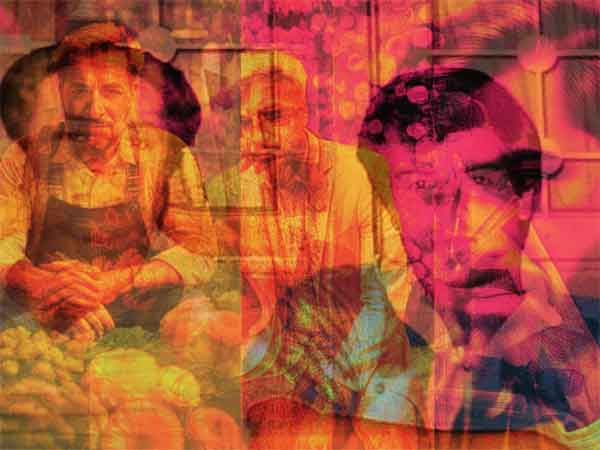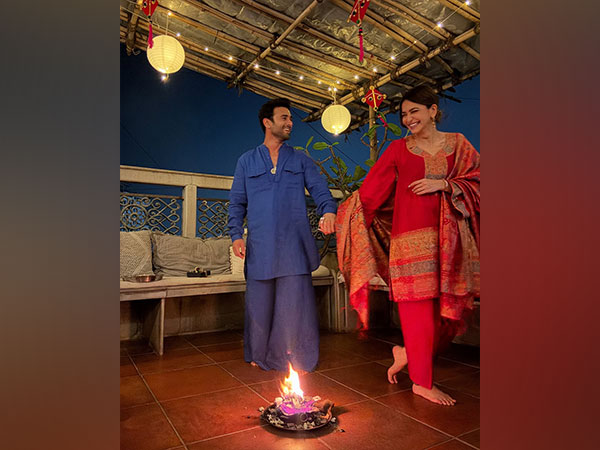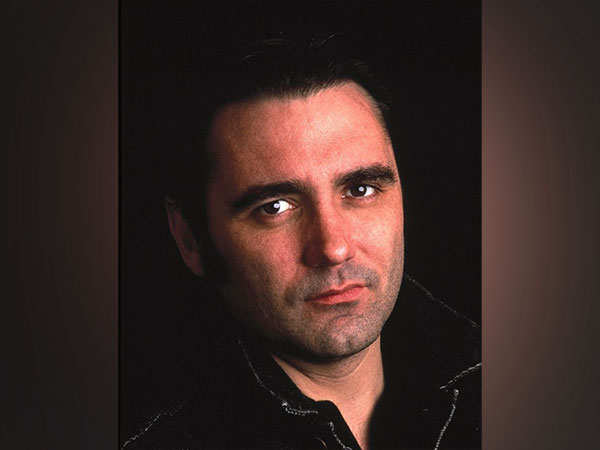New Delhi [India], January 14 (ANI): There is an arc to creativity–a curve that begins in the quietest corners of our being, sometimes unnoticed, sometimes fragile, and carries us through life. It is not a straight line but a meandering path, woven with moments of discovery, loss, rediscovery, and growth. My own journey as an artist, a chef, a writer, and a creator has been shaped by this arc, and today, it feels like it has come full circle. To find two of my works displayed among 250 incredible pieces in The Art of India, a breathtaking exhibition curated by the visionary Alka Pande, is a moment of profound gratitude and reflection. This exhibition, held at the India Habitat Centre, celebrates not only art but the very essence of humanity–our ability to express, to connect, to include, and to create.
My earliest memories of creativity are tied to the warmth of a kitchen, where Panditji, our Brahmin chef, would transform simple vegetables into extraordinary feasts. At five or six years old, I would sit by his side, watching him weave magic with his hands. But it wasn’t just food he cooked–it was stories, lessons, and a philosophy of life. In that kitchen, he taught me about inclusion, about respecting the ingredients, about the sacredness of everyday acts. That kitchen became my first art studio, my first lesson in the Indian way of being–one of connection to nature, to humanity, and to ourselves.
As I grew older, art became my sanctuary. There wasn’t a craft I didn’t try–painting, stitching, macrame, tie-dye, sculpture, embroidery, dressmaking. My hands became an extension of my imagination, and the world around me was a canvas waiting to be transformed. At school, under the watchful eyes of extraordinary teachers, this passion deepened. Mrs. Mari Arora, with her elegant voice and commanding presence, taught us to sketch with discipline and exuberance, to channel restless energy into vivid creations. Ms. Shubhika Lal showed us how to mold clay into forms that spoke of hope, adventure, and resilience. And then there was Ms. Sabiha Hashmi, my senior art teacher, who became more than a mentor–she became my guide, my confidant, my dream maker.
Ms. Hashmi’s art room was my refuge. In her presence, I found permission to be myself. She introduced me to silkscreen printing, tie-dye, oil painting, and calligraphy, but more than techniques, she gave me the confidence to express. In her art room, I could pour my fears and insecurities into my work, finding catharsis in every stroke, every layer of color. She saw me when I couldn’t see myself, and her unwavering belief laid the foundation for everything I would go on to create. It was she who taught me that art is not just a skill–it is a way of being, a language for the soul, a bridge between inner turmoil and outer expression.
When I graduated, I carried this passion to J.J. School of Art in Mumbai, where I studied graphic design, and later to the School of Visual Arts in New York. The city was a mosaic of inspiration, and I immersed myself in graphic design, photography, and art history. But life has a way of redirecting us, and a lost portfolio–a collection of hundreds of my works–forced me to pivot. What felt like a devastating loss at the time turned out to be a nudge toward reinvention. I found myself in the world of food, where creativity took on a new form. At our restaurant Devi in New York, my partner and I became the first Indian chefs to earn a Michelin star. People would tell me that my dishes were like art on a plate, that I painted pictures with flavors. It was proof that creativity, like water, always finds its own level.
Yet the pull of art never left me. Years later, as I returned to India to heal from an illness, I found myself creating digital art–a layering of photography, design, and emotion that became my outlet, my therapy, my way back to myself. It was during this period that Alka Pande, a luminary in the world of art, entered my life. She saw something in my work that I hadn’t yet dared to see. Her belief, her invitation to be part of The Art of India, became the affirmation I didn’t know I needed.
This exhibition is a testament to the enduring power of art. It spans generations, from the grandmasters of Indian art to contemporary voices, weaving a rich tapestry of tradition and innovation. To stand alongside legends like Amrita Sher-Gil, whose life and work taught me to embrace my identity, and M.F. Husain, whose generosity and brilliance I had the privilege of experiencing firsthand, is an honor beyond words. Sher-Gil’s Sketch II, Husain’s bold canvases, and Jamini Roy’s reinterpretations of Indian folk art remind us of the unbroken thread of creativity that runs through India’s history.
The exhibition also celebrates the voices of today, those who are redefining Indian art on the global stage. Asha Thadani’s evocative photography captures the vulnerability and resilience of marginalized communities, while Bandana Jain’s sustainable art challenges our perceptions of materials. Mandakini Devi’s Womb Series explores identity and femininity through layered digital prints, revealing the complexity of womanhood in a deeply introspective way. Malavika A.K. Prasanth’s Echoes in Colour speaks of rebirth and self-discovery, while Lyla FreeChild’s fearless works celebrate femininity and inclusion. These artists remind us that art is not confined to aesthetics; it is a force for change, a reflection of society, a call to action.
The Art of India is more than an exhibition–it is an invitation. It invites us to explore not just the works on display but the themes they embody: identity, migration, inclusion, love, and expression. It is a celebration of life in all its complexity, a reminder of our shared humanity. I urge everyone to visit, to immerse themselves in this visual symphony, to bring art into their homes and lives. Because art has the power to transform. A piece on your wall is not just decoration; it is a story, a dialogue, a source of energy that can inspire and uplift.
Art has always been a connector, and in my journey, it has connected me to extraordinary people who have shaped and supported me. My friends Aamir Rabbani, Mohit Jain, Yogi Suri, and Megha Joshi have been my anchors. They celebrated my efforts when I doubted myself, encouraging me to create even when I thought I was failing. Their belief gave me the courage to persevere, to find beauty in the process, and to keep going. My family, too, has been my bedrock. My mother, with her quiet strength, saw beauty in my digital art when I couldn’t. Her joy became my hope, a reminder that even in moments of isolation and struggle, creation is a form of connection.
As I reflect on this journey, I am filled with gratitude–for my teachers, my friends, my family, and for Alka Pande, who dared to dream for me when I couldn’t. I am reminded that creativity is not a straight path but an arc, one that bends and curves, carrying us through seasons of doubt and renewal, loss and rediscovery. It is a journey that belongs not just to me but to all of us. For creativity is not the privilege of a few–it is the birthright of everyone. It is the common thread that binds us, that reminds us of our shared humanity, that gives us hope and joy and meaning.
So let us celebrate this arc, this journey of art and expression. Let us visit exhibitions like The Art of India, support artists, and bring their works into our homes. Let us allow art to transform our spaces, to infuse our lives with new energy and creativity. Let us recognize that in every brushstroke, every photograph, every sculpture, there is a story–a story of resilience, of hope, of the boundless human spirit.
And as we stand before these works, let us remember that we, too, are creators. That within each of us lies the capacity to imagine, to express, to connect. That the arc of creativity is infinite, ever-expanding, carrying us forward, together, toward a brighter, more beautiful world. (ANI/Suvir Saran)
Disclaimer: Suvir Saran is a Masterchef, Author, Hospitality Consultant And Educator. The views expressed in this article are his own. (ANI)
Disclaimer: This story is auto-generated from a syndicated feed of ANI; only the image & headline may have been reworked by News Services Division of World News Network Inc Ltd and Palghar News and Pune News and World News
HINDI, MARATHI, GUJARATI, TAMIL, TELUGU, BENGALI, KANNADA, ORIYA, PUNJABI, URDU, MALAYALAM
For more details and packages

















